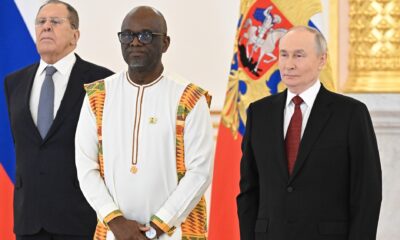Agriculture
Audu Ogbeh’s Intensive Assignment At Agric -By Salisu Na’inna Dambatta

I can vividly recall that in one of their private discussions as members of the National Reconciliation Committee (NARECOM) to which I was Press Officer, Chief Audu Ogbeh, told some of his colleagues, namely Alhaji Asheikh Jarma, Alhaji Bilyaminu Usman, Alhaji Abubakar Abubakar Barde and a member of the Committee from Ebonyi State that for him, the nationwide consultative tour undertaken by the Committee to gather and analyse grievances and propose solutions to the grievances was “an intensive political education about the Nigeria.”
Just for context, the National Reconciliation Committee was established by the Administration of General Sani Abacha as a platform for aggrieved Nigerians to express their grievances in the aftermath of the annulment of the Presidential election conducted on June 12, 1993. It functioned between February 1996 and July 1998.
Now nearly twenty years after making that statement, Chief Audu Ogbeh is into another intensive national, probably more critical assignment, which involves information-gathering, analyzing and the articulation of actionable proposals that could finally make it possible for Nigeria to ride on the back of agriculture to diversify its economy and wean it from dependence on a single main foreign currency earner.
His assignment at the Ministry of Agriculture and Rural Development as gleaned from several phrases and sentences in some of the key speeches of President Muhammadu Buhari and amplified in the 2016 budget speech, goes beyond consolidating and sustaining our self-sufficiency in the production of our main staples.
The assignment requires imaginative reforms in the sector. It is more than erasing the unnecessary importation of rice dressed in chemicals, low-quality wheat, adulterated cooking oil, rotten poultry and expired dairy products.
Chief Audu Ogbeh’s current mandate as Minister of Agriculture and Rural Development centres more on reverting agriculture to its preeminent position as the single largest generator of hard currency for Nigeria as it was for 45 years out of the 60 years in which Nigeria was under direct colonial rule, and form 1960 up to mid-1970s.
This is not to suggest that Nigerian agriculture has declined as generally assumed, or that it is performing poorly. The reality is far from that. Many indicators such as Nigeria being the world’s superpower in cassava production, which is estimated at 37 million metric tonnes per annum; unassailable position of consistently being world’s second largest producer of food sorghum as well as being the number three largest producer of millet in the world after India and China, show that the sector is not the laggard some people want everyone to think it is.
As the largest producer of cow pea in the world and a strong leader in groundnut production for instance, Nigeria does not need to revive the Groundnuts Pyramids of Kano, Gusau and Kaura Namoda or export the commodity abroad, to prove that our farmers now produce more groundnuts than they did during its production as an export commodity between 1932 and 1973. The truth is that all the groundnuts produced in Nigeria is consumed at home, milled in the hundreds of small-scale Oil Mills in major cities and towns all over Nigeria or grinded and used as a condiment in stews in homes and restaurants, thanks to our large population.
The National Bureau for Statistics (NBS) has consistently reported, including in its latest Bulletin, that the sector is the largest single contributor to the country’s Gross Domestic Production of goods and services (GDP), contributing more than twice the percentage the Oil Industry contributes.
This is not surprising given that besides being the single largest employer of labour, the Nigerian agricultural sector is the number two earner of foreign exchange for Nigeria through the export of various agricultural products including sesame seeds, cassava chips, Cocoa beans, hides and skins (leather), gum arabic, some fruits, Shea nuts and butter, and informally, basic stables such as yams, cashew nuts, sweet potatoes, ffresh fruits, millet and sorghum to some neighbouring countries.
Indeed, Nigeria’s self-sufficiency in roots and tuber namely yams, sweet and Irish potatoes, cassava and Coco yam; and most vegetables such as Okra, tomatoes, pepper, very hot and mild chilly, soybeans and almost an endless list of fruits, testified to the fact that ours is a blessed country.
The big jinx in the sector is in commoditizing additional agricultural products and exporting them to markets all over the world. One of the issues Chief Audu Ogbeh may consider intensely is the identification of those exportable products, their relevant markets, required value addition to attract near-premium prices and the sustainability of supply at the agreed quality standard to the foreign buyers.
For instance, after exporting cassava chips worth over US$118 million to China a few years ago with a promise to deliver more, there appears to be in a loud silence on that front. Is that market dry? If so, why? It can be explored, revived and expanded to make the labour spent on large-scale cassava production by members of the Cassava Growers Association of Nigeria is worthwhile and appropriately rewarded. While in office, President Olusegun Obasanjo found a potential market for Nigerian cassava in Russia, which may now need a follow-up or revival.
There was a plan to establish several new factories for squeezing starch out of cassava in the country. Cassava farmers, who are now complaining of poor market for the commodity, could turn into millionaire-farmers if such factories come on stream and find reliable markets for starch.
The progressing construction of Cargo Terminals at selected airports in Nigeria for the exportation of perishable commodities is important, but identifying and training the farmers who would produce the commodities and setting up the farms and plantations for the production of the perishable goods, are some of the tasks that Chief Audu Ogbeh, an experienced large-scale farmer in his own right, needs to pursue with great intensity, in his role as the country’s Minister of Agriculture and Rural Development.
– Dambatta wrote in from Abuja










